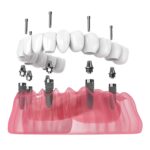Toothbrush For Dentures
Dentures are a great solution for those who have lost their natural teeth, restoring both function and appearance. However, just like natural teeth, dentures require proper cleaning and maintenance to stay in good condition. Using the right toothbrush for dentures is essential to remove plaque, prevent stains, and maintain overall oral hygiene.
In this guide, we’ll discuss the importance of choosing the right toothbrush for dentures, the best cleaning methods, and answer common questions about denture care.
Why Denture Cleaning is Important
Unlike natural teeth, dentures are made from acrylic, porcelain, and metal components, which require special care. Improper cleaning can lead to several issues, including:
- Bacterial and Fungal Growth – Dentures can harbor bacteria and fungi, leading to infections like denture stomatitis.
- Staining and Discoloration – Food, beverages, and smoking can cause denture stains.
- Bad Breath – Unclean dentures can contribute to persistent bad breath.
- Shortened Lifespan – Without proper cleaning, dentures can wear out faster.
Using a soft-bristled toothbrush designed for dentures ensures that your appliance stays clean and free from damage.
Types of Toothbrushes for Dentures
1. Denture Brushes
Denture brushes are specifically designed for cleaning dentures. They usually have:
- Two brush heads – One large flat head for cleaning broad surfaces and a smaller tapered head for cleaning hard-to-reach areas.
- Soft bristles – To prevent scratching or damaging the denture surface.
2. Soft-Bristled Toothbrushes
If you don’t have a denture-specific brush, a regular soft-bristled toothbrush can also be used. Avoid using hard-bristled toothbrushes as they can scratch the denture surface, making it more prone to stains and bacterial buildup.
3. Electric Toothbrushes for Dentures
Electric toothbrushes with soft bristles and gentle vibrations can be used for cleaning dentures. They help remove plaque more efficiently without applying excessive pressure.
4. Ultrasonic Denture Cleaners
While not a traditional toothbrush, ultrasonic cleaners use sound waves to remove plaque and debris from dentures. These devices are great for deep cleaning but should be used in combination with a regular denture brush.
How to Clean Your Dentures Properly
Step 1: Rinse After Eating
After meals, remove your dentures and rinse them under lukewarm water to wash away food particles and debris.
Step 2: Brush Your Dentures Daily
Use a soft-bristled toothbrush or a denture brush to clean your dentures at least once a day. Avoid using regular toothpaste as it can be abrasive and may damage the denture material. Instead, opt for a denture cleaning solution or mild soap.
Step 3: Soak Overnight
Dentures need to stay moist to maintain their shape. Soak them overnight in a denture cleaning solution or lukewarm water. Avoid using hot water, as it can warp the dentures.
Step 4: Clean Your Mouth and Gums
Even if you wear full dentures, it’s important to clean your gums, tongue, and palate daily using a soft toothbrush or a damp cloth. If you have partial dentures, brush your remaining natural teeth as well.
Step 5: Rinse Thoroughly Before Wearing
Before putting your dentures back in, rinse them thoroughly to remove any cleaning solution that may cause irritation.
What to Avoid When Cleaning Dentures
To prolong the life of your dentures, avoid the following:
❌ Abrasive Cleaners – Regular toothpaste, baking soda, and hard-bristled brushes can scratch dentures.
❌ Bleach or Harsh Chemicals – These can weaken the denture material and cause discoloration.
❌ Boiling Water – Hot water can warp dentures, making them ill-fitting.
❌ Skipping Nightly Soaking – Dry dentures can become brittle and lose their shape.
Best Toothbrushes for Dentures in 2024
When choosing a toothbrush for dentures, consider these features:
✔ Soft or Extra-Soft Bristles – To prevent damage.
✔ Ergonomic Handle – For a comfortable grip.
✔ Two Brush Heads – For better cleaning coverage.
✔ Electric or Manual Options – Depending on your preference.
Some of the best toothbrushes for dentures include:
- Denture-specific toothbrushes with dual heads.
- Soft-bristled manual toothbrushes for a gentle clean.
- Electric toothbrushes with sensitive settings for thorough cleaning.
Westwood Gardens Dental Clinic: One of the best dental clinics in Richmond Hill, Ontario
For those in Richmond Hill, Ontario, Westwood Gardens Dental Clinic is a trusted provider of high-quality dental care, including partial dentures. Call them today at 647-905-7303 or email info@westwoodgardens-dental.ca to schedule a consultation. You can also visit their clinic at Unit 18, 8868 Yonge St, Richmond Hill, ON, L4C 1Z8 for a comprehensive assessment and personalized treatment plan.
FAQs
1. Can I use a regular toothbrush to clean my dentures?
Yes, but it must be a soft-bristled toothbrush to avoid scratching the dentures. Hard-bristled toothbrushes should be avoided.
2. Should I use toothpaste on my dentures?
No, regular toothpaste can be too abrasive. Instead, use a denture cleaner, mild soap, or dishwashing liquid for cleaning.
3. How often should I replace my denture brush?
Like regular toothbrushes, denture brushes should be replaced every 3 to 4 months or sooner if the bristles become worn.
4. Can I use an electric toothbrush to clean my dentures?
Yes, as long as it has soft bristles and gentle vibrations to prevent damage to the dentures.
5. How do I remove stains from my dentures?
You can soak dentures in a denture-cleaning solution or use a mix of vinegar and water to help remove mild stains. Avoid using bleach or harsh chemicals.
Conclusion
Cleaning your dentures properly is essential for maintaining their appearance, functionality, and longevity. Using the right toothbrush for dentures, whether a denture-specific brush, a soft-bristled toothbrush, or an electric toothbrush, can help keep your dentures free from stains, bacteria, and plaque buildup.
Regular cleaning, daily rinsing, and avoiding abrasive cleaners will help your dentures stay fresh and comfortable. If you’re unsure which toothbrush to use, consult with a dental professional for personalized recommendations.
By following these simple steps and choosing the right toothbrush, you can keep your dentures clean and maintain a healthy, confident smile!




